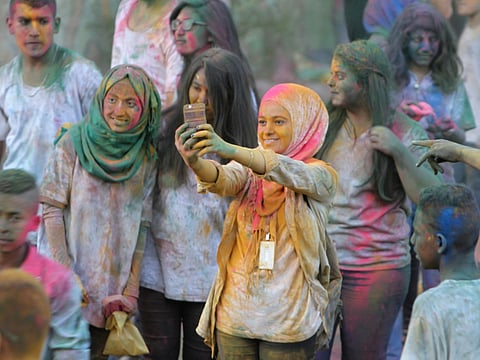Palestinians hold Holi-like festival
Organisers say they were surprised by the level of interest in event inspired by Holi celebrations in India

Ramallah: Following its resounding success in Ramallah, the Palestinian organizer of last week’s “Festival of Colours” plans to organise a repeat of the artistic celebration in October.
Huge participation from around the West Bank is expected.
Fuad Salah Al Yamani, the 19-year-old organiser of the festival who is a junior accounting student at Al Quds Open University, gives the credit for his festival’s huge success to the criticism and attacks the festival received from people who maintained that it violated Palestinian customs and traditions.
“I do not take criticism into real account. I have been happy with this criticism which paved the way for the huge success of the festival,” Al Yamani, told Gulf News.
He shares a workshop in the area of Al Rukab in Ramallah with a group of young Palestinian painters.
Since early childhood Al Yamani has been totally taken by the hobby of painting which his father practiced. He joined the Palestinian Young Artists Forum and recently decided to organise an artistic event under the sponsorship of his group. One day while watching a TV programme on the Hindu spring festival of Holi which is also known as the Festival of Colours or the Festival of Love, he became inspired to copy the idea in Palestine. “I announced my intention to organize a Colour festival in Ramallah and the response in the social media was encouraging as at least 900 people RSVP’d to attend the festival,” he said. He admitted that he expected 100 of these people to actually attend the festival, but was surprised when double that number, comprising both men and women, attended.
After the 90-minute festival, Al Yamani returned home to find that pictures of men and women celebrating the festival, posted on the social media had created a surprising response with many criticising the festival for encouraging gender mixing.
“The reaction of the Palestinian public was shocking for me, but I did not care much,” he said. “What I had done, did not in any way humiliate any religion or faith. It is merely a small artistic and entertaining activity to honor my workshop.”
The festival’s success prompted Al Yamani to organise another one in October, but on a larger scale. He will invite Palestinians in the Occupied West Bank to attend and expects to have ten times the amount of people.
The first Festival of Colours was organized in a private stadium, but the coming activity will be organized in a spacious public place to give the audience a better chance to celebrate the festival, he said.
“Coexistence between men and women occurred and both sexes came to the same activities like the singing party of the Palestinian singer Mohammad Assaf,” he said. “Criticism of pictures showing men and women together was not logical. Most of the pictures depict either men or women and when they are seen in the same picture a distance separated them from each other.”
Al Yamani said that his father, mother, sisters and relatives attended the festival which was an opportunity for art, paint, joy and happiness to discharge the energy of Palestinian youth born under the Israeli occupation.
“The Palestinian public judged the festival by the pictures but if they attended the festival, they would have a different viewpoint about it,” he said.
“Palestinian society is known for criticizing everything. I do not mind going against the customs and traditions when I solidly believe I am right,” he said.
Sign up for the Daily Briefing
Get the latest news and updates straight to your inbox



